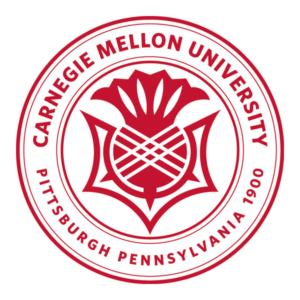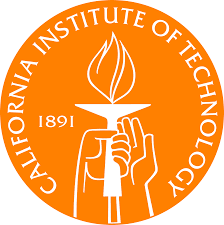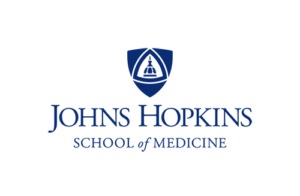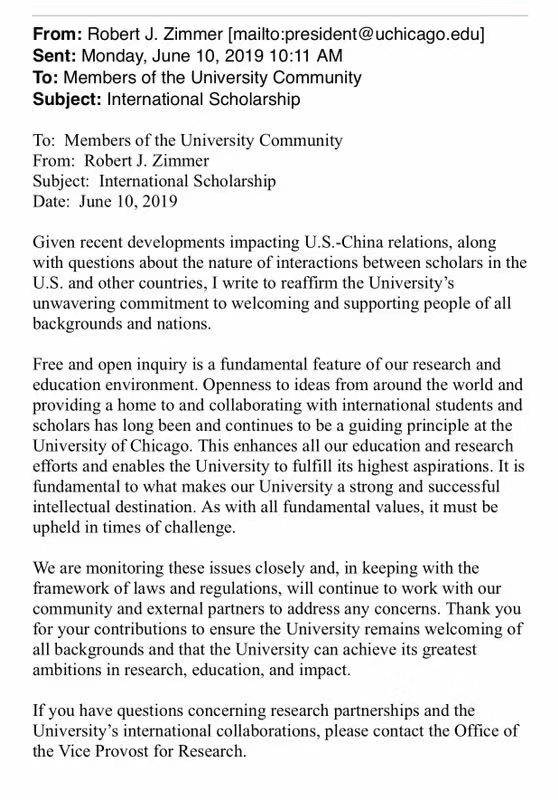Carnegie-Mellon is the latest to answer to UCA’s Call to Speak Up, joining U-Pitt, John Hopkins, and more...
Further development since last update. (Click for details). Carnegie-Mellon University, joining U-Pitt, John Hopkins, UChicago, UC San Diego, and Caltech, issued statement to CMU community supporting Chinese and other international scholars and students. More institutions previously issued similar statements since February, 2019. Read the original call-to–speak-up (click here).
08/15/2019

Dear Members of the Carnegie Mellon University Community,
I write to you today about the vital importance of America’s research universities to our economic prosperity and national security, and the need to recommit to what has made us so successful. As public concerns and political debates emerge about global engagement in higher education, we must ensure that our research ecosystem remains strong. This requires steadfast commitment to both the free flow of ideas and the safeguarding of our work as required by the national interest.
In this time of intense rhetoric and in the wake of recent incomprehensible tragedies, it is important to remember that the United States is a nation of immigrants. People the world over flowed into this land, continually tempering and galvanizing us with new ideas and spurring the relentless renewal that has defined our global leadership. Here in Pittsburgh, generations of immigrants forged futures for themselves and their families — and the nation — in the factories lining the three rivers. Andrew Carnegie, an immigrant from Scotland, founded the Carnegie Technical Schools to educate the sons and daughters of those factory workers.
With this in our DNA, Carnegie Mellon has been an international university since our inception more than a century ago. And as our institution has grown and transformed, we have always been at the cutting edge of countless fields, such as artificial intelligence, performing arts, engineering, computational finance and behavioral economics, precisely because we have kept our doors open to the best and brightest from around the country and around the world. This is who we are and who we always will be. As an immigrant myself, I value this fundamental principle on a very personal level.
In the context of this great, open, immigrant nation, we also must recognize that foreign influence in the form of intellectual property theft, cyber attacks, espionage and other broad-scale, state-sponsored efforts are direct threats to our nation’s security and economic prosperity. Carnegie Mellon takes these threats seriously. At the same time, the negative tone of the public discourse on international issues and unjust scapegoating of segments of our community are causing mounting anxiety and unease on campuses across the country. Our campus, especially our international community, is not immune from this anxiety and we must take this just as seriously.
To break through the heat of this debate — one that is tinged with controversy and concern involving both immigration policies and U.S.-China relations — we must ask a fundamental question: how can we preserve and enhance the diverse research, education and innovation ecosystem that has fueled our nation’s broad prosperity since World War II? In other words, can we be both open and secure? I believe we can.
First, we must be — and are — ever-vigilant to protect our work and safeguard the national interest by following best practices, applicable laws and policies that shield us from foreign interference and exploits. We will continue to work directly with national policymakers and our colleagues at the Association of American Universities (AAU) to preserve the integrity of university-based research. Mary Sue Coleman, president of the AAU, and Peter McPherson, president of the Association of Public Land-grant Universities, recently penned a joint op-ed about academic institutions preserving open collaboration while maintaining vigilance with respect to national security. Carnegie Mellon is proud to be part of a network of universities committed to both.
Second, we must double down on what we do best: leading the world in innovation, creativity and finding solutions to society’s most pressing challenges. America’s research and innovation ecosystem is the envy of the world, and it is powered by higher education, serving as an extraordinary engine of social mobility and catalyzing our nation’s economic prosperity. Our research enterprise has been successful because we have always competed globally not in the hope that others will lose, but in the belief that when we win, the world wins. That’s why we must not retreat from global engagement. We must not change how we do research. We must not cripple the engine that has delivered amazing benefits for society. In this most disruptive age, our nation must invest and out-innovate.
Finally, as a nation we must prioritize immigration policies that are central to continuing our global work and deepening our commitment to national security. This ranges from the need for swift and accurate resolution of visa and other immigration determinations for those seeking to join our university communities, to a final action by Congress on the Deferred Action for Childhood Arrivals (DACA) program. As we have before, we encourage our nation’s leaders to finally provide a solution for DACA students who came to the United States as children, were raised here and have always called America their home.
Today, CMU’s researchers and scholars are undertaking bold projects to solve real-world problems. Our discoveries in areas like robotics and cybersecurity enhance our nation’s economic prosperity and safety. We have been successful on those fronts only because of the dedication and contributions of all of our scholars and students, many of whom come from all over the world.
So, to the members of our international campus community, without hesitation and with heartfelt affirmation, let me say: We value you. We support you. We will always welcome you. This is a campus that is unafraid of inclusivity. We are compelled and defined by it. And that will never change.
Earlier this year, I charged CMU’s Committee on International Engagements with developing principles and processes to guide our efforts in the way we engage international partners. This work is happening in earnest — work that will result in our sustained ability to advance knowledge and develop talent through our research and educational missions. The committee will share its recommendations with the university community this fall.
As we embark upon a new academic year full of promise and opportunity, let us reaffirm our belief in the power of education to transcend social and economic divides. Let us take pride in knowing how much our work matters. And let us continue embracing the diversity that has always made, and continues to make, it all possible.
Warm regards,
Farnam Jahanian
President
Henry L. Hillman President’s Chair
Carnegie Mellon University
07/22/2019

Dear Fellow Pitt Community Members:
Our very mission—to leverage knowledge for society’s gain—demands a global perspective. We seek to tackle the world’s greatest challenges. We welcome the most talented faculty, students, staff and visitors from near and far. And we collaborate with the most distinguished scholars, universities and research institutions from around the world.
These international pursuits and collaborations are the oxygen for the University of Pittsburgh’s vibrant and rich academic environment. Some of our most celebrated members—scholars and discoverers like Yuan Chang, Adolf Grünbaum, Cho-yun Hsu, Maud Menten, Carmelo Mesa-Lago, Wangari Maathai and Vladimir Zworykin—chose to join our University community and have written significant chapters in Pitt’s remarkable history of accomplishments and achievements. Today, as our celebrations for the Year of Pitt Global conclude, I am confident that some of the brightest storylines in Pitt’s future will be authored by faculty, students and staff who have also joined our University from afar.
Yet, this long-standing tradition of global academic engagement is increasingly under attack. Rising geopolitical tensions over economic competitiveness, trade and national security have begun to erode support for the robust global academic engagement that we have long enjoyed—and which is crucial for Pitt’s continued success.
National and economic security are based, to a large extent, on access to the latest knowledge and technology. This linkage places research-intensive universities like Pitt at the front lines of these issues. As a result—and for the first time since the end of the Cold War—university-based research and scholarship are facing calls to restrict global engagement. A rising tide of fear is fueling uncertainty, confusion and rapidly changing responses by our federal agencies, and the effects of government policies on research universities have been especially striking.
Collaborations between scientists across national boundaries have been subject to unprecedented scrutiny. Established practices have been prohibited on technicalities. And researchers, particularly immigrants and visitors from China, have been the target of aggressive investigations and public sanctions.
At Pitt, our mission demands better—and so does our University community.
As a public institution, we will continue to uphold all laws governing research, innovation and international partnerships while fostering a vibrant and globally engaged university. As a world leader in research and learning, we must both excel at our mission and protect public interests—despite the difficult climate and challenges involved.
This work requires us to remain engaged with Congress, federal agencies and national university associations to advocate for sensible and clear government actions that address real threats without causing irreparable harm to our nation’s research universities, which are still admired around the world.
It also requires us to issue new guidance as needed. As a result, I urge everyone to pay close attention to new information, since this is one of the best tools we have for helping our community members navigate the current, rapidly shifting legal and regulatory environment.
And, when new guidance does arrive, we promise to assist any affected University community member and to do so without fear, prejudice or invidious distinctions based on an individual’s nationality, ethnicity, race or country of origin.
For the international members of our academic community, I will state the obvious: You belong here. We welcomed you to our campus in good faith and in compliance with all applicable laws and regulations, and we want you to have a productive and positive Pitt experience. We will continue to do our part to help you feel at home here—no matter where else you have called home.
I invite our extended University community to join me in this effort, and—as always—I look forward to seeing what we can accomplish together.
Sincerely,
Patrick Gallagher
07/11/2019

To: The Caltech Community
From: Thomas F. Rosenbaum, President and David A. Tirrell, Provost
Date: July 11, 2019
Re: Our International Community of Scholars
The strength of the United States as a scientific, technological, and economic power has depended crucially on the contributions of scholars and entrepreneurs from all over the world. Our universities, in particular, have long opened their doors to foreign talent, seeking to become destinations for the most creative, original minds, irrespective of heritage or national origin. At Caltech, 45% of our faculty were born outside the United States, and roughly the same percentage of our graduate student body is international. Approximately 35% of American Nobel Prizes in the sciences have been awarded to individuals born outside the United States.
Recent news stories and communications from government agencies have raised concerns about threats to U.S. national security and economic competitiveness, concurrent with rising tensions in international trade and the growing technical capability of international corporations. In such a climate, it can be tempting to try to protect our national interests by putting boxes around our researchers and our laboratories, to attempt to constrain the transfer of scientific discoveries and technological innovation. But the academic enterprise is utterly ineffective in that mode; it depends on talent and interaction and the challenge of ideas, all of which may arise anywhere in the world. Our universities thrive by bringing together people of diverse perspectives, of different backgrounds, of distinct sensibilities, and letting them hone their conceptions of the world by confronting and shaping each other’s ideas.
It is essential that we maintain the open, vibrant sense of community that is so central to successful scholarship and innovation. In particular, we must ensure that our international colleagues – students, postdoctoral scholars, staff, and visitors – continue to feel welcome here, and continue to enjoy the personal and professional support that they need to pursue their most ambitious goals. We have heard from some of these colleagues that they are feeling heightened stress, not because of actions taken by our community, but because of the broader public conversation and policies that are understandably unsettling. Under such circumstances, we must all make special efforts to reaffirm our embrace of scholars from all over the world, our commitment to open exchange, and our celebration of the richness of international collaboration.
07/09/2019

Dear Johns Hopkins Community:
Over the past several months, we have watched with growing concern the change in tenor of the national dialogue regarding the role of universities in supporting the open international exchange of ideas and people, while also preserving U.S. national security interests. Amid increased scrutiny by Congress and government agencies of research endeavors involving foreign-born faculty and students, recent media attention to potential national security threats posed by foreign governments’ access to intellectual property, and foreign nations warning students about studying in the United States, our international community of students and scholars at Johns Hopkins have expressed mounting anxiety and concern.
We write today to reaffirm our enduring commitment to our international students, researchers, and patients. The success of a research university like ours is predicated on the open, robust exchange of ideas; enhanced by our ability to welcome people with different academic and practical training, experiences, cultural backgrounds, and viewpoints; and improved by our capacity to nurture talent from around the world.
Johns Hopkins has a long and storied history of international collaboration in research, education, and patient care, from Dr. William Welch’s partnerships in medical education in China in the early 20th century to our academic and clinical commitment to fight AIDS in sub-Saharan Africa. Today, our faculty are working in more than 110 countries, and we are expecting an entering class of undergraduates that boasts the highest percentage of international students in our history. They will be welcomed into an academic community that includes more than 7,000 international students, faculty, and researchers, who hail from more than 120 nations and share our commitment to discovery that makes a measurable impact on the quality of human life.
We are also an institution with a proven commitment to protecting our nation’s security and advancing its economic success. Consistent attention to best practices in disclosing, managing, and securing federally funded information and intellectual property protects the integrity of our research and its use beyond the borders of our institution.
We believe that that these twin commitments can and must be maintained, and that we must remain vigilant about the long-term consequences of sacrificing one to the other. When any members of our community unfairly bear the burden of government mistrust simply by virtue of their place of birth, country of residence, or ethnicity, we risk undermining the core tenets of our success as an institution and as a nation. The potential for such scrutiny to have a deadening effect on the free and unfettered pursuit of ideas and the important contributions of international scholars and researchers is distressing in the extreme. Our great societal challenges are not constrained by geographic boundaries, and our pursuit of solutions must therefore also transcend those borders.
As Johns Hopkins pursues innovation and discovery to benefit our nation and our world, we will advocate for sound policies that allow us to continue to be a place of open academic exchange. We remain steadfast in supporting our colleagues and students from abroad who have committed themselves to our shared pursuit of truth and service to humanity.
Sincerely,
Ronald J. Daniels
President
Johns Hopkins University
Sunil Kumar
Provost and Senior Vice President for Academic Affairs
Johns Hopkins University
Paul B. Rothman
Dean of the Medical Faculty
CEO, Johns Hopkins Medicine
06/13/2019

ALL ACADEMICS, STAFF AND STUDENTS AT UC SAN DIEGO
| SUBJECT: | Reaffirming Our Support for UC San Diego’s International Community |
In recent months, increased media attention focusing on the diplomatic and economic tensions between the United States and foreign countries have led to greater scrutiny of academic exchanges. In turn, a feeling of unease has developed among many international students and scholars here at UC San Diego and at other universities across the country.
As one of the premier research institutions in the U.S., UC San Diego engages in cutting-edge, impactful research and pedagogy with our global partners. We are mindful of the reality of economic and technological espionage and the importance of confidential and proprietary information. UC San Diego takes great care in protecting our intellectual assets while encouraging global engagement.
At a time when national security issues lead news reports, it is critical that we remain welcoming to students, staff, faculty, visiting scholars, and other members of our community who come from other countries, or for whom those countries are an ancestral home.
UC San Diego is unequivocally committed to its international students and scholars. We value every member of our community and actively cultivate a diverse and inclusive campus that encourages respectful open dialogue per our longstanding Principles of Community.
More than 8,700 undergraduate, graduate and non-degree students from outside the United States, representing 111 countries, study at UC San Diego, and more than 1,500 international scholars conduct research and provide instruction. Within our faculty are more than 400 educators from around the world who create knowledge, teach and mentor students, and add immeasurable value to our collaborative intellectual community. The university also employs a number of individuals from around the world who serve in a wide variety of roles that sustain UC San Diego’s world-class reputation of local, national and global impact in service to others.
Together, these individuals make significant contributions to UC San Diego’s research and educational endeavors. By bringing the most talented and promising students and scholars to our university, and working closely with knowledge partners across the globe, we are better able to collaborate and find solutions to the world’s most pressing issues.
If you have concerns about aspects of research partnerships taking place at UC San Diego, we encourage you to contact the Office of the Vice Chancellor for Research at vcresearch@ucsd.edu. For more information on UC San Diego’s international student population, contact the Office of the Vice Chancellor for Student Affairs at vcsa@ucsd.edu. For questions concerning faculty, contact the Office of the Executive Vice Chancellor for Academic Affairs at evc@ucsd.edu.
UC San Diego is a student-centered, research-focused, service-oriented public research university, open to people from all over the world. We are proud to support research and educational collaborations with both domestic and international scholars and partners. International exchanges are instrumental in opening and sustaining important dialogues that ultimately make our world a safer, more equitable place to live.
Pradeep K. Khosla
Chancellor
06/10/2019

